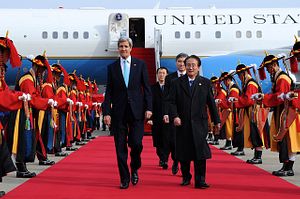This is the seventh article in a series on the U.S. alliance with South Korea. Previous articles can be found in The Diplomat’s Koreas section.
Since its beginning, the U.S.-South Korea alliance has remained focused on security challenges on the Korean Peninsula; but new areas for cooperation are developing. The ROK has supported several U.S. overseas engagements throughout its history, including sending personnel to support the U.S. mission during the Vietnam War, and more recently in both Iraq and Afghanistan. Two areas in which South Korea is becoming more active include peacekeeping and anti-piracy operations. In both of these, the ROK is helping to provide an international common good, supporting U.S. priorities, and acting independently of the alliance structure. These trends are part of the “Global Korea” foreign policy first articulated by President Lee Myung-bak, intended to increase South Korea’s participation and influence in international governance.
The ROK first participated in peacekeeping missions in 1993, sending as engineering unit to Somalia. Currently it has 614 personnel deployed in peacekeeping missions, and since 1993 has deployed around 11,000 personnel to 17 different countries. To facilitate participation in peacekeeping operations (PKO), the Ministry of National Defense (MND) created a unit of 3,000 personnel dedicated to overseas deployment. In 2004, the MND established a PKO Center at the Korea National Defense University to provide pre-deployment education and research on ROK participation in PKOs. While ROK participation in PKOs is under the aegis of the United Nations instead of the U.S.-ROK alliance, the United States has a strong interest in global stability, and as a permanent member of the U.N. Security Council, has a stake in the success of U.N. peacekeeping.
Since 2009, the ROK has deployed the Cheonghae Unit for anti-piracy missions in the Gulf of Aden, near Somalia. In those six years, the Cheonghae Unit has rescued 31 ships and escorted more than 11,000. In addition to providing valuable support for ships sailing through dangerous waters, the ROK Navy has gained coalition experience through its membership in Combined Naval Task Force 151 (CTF-151), a multi-national task force dedicated to combating piracy in the region. South Korea, along with the United States and 18 other nations, is also a member of the Regional Cooperation Agreement on Combating Piracy and Armed Robbery (ReCAAP). ReCAAP is a multilateral agreement that fosters information sharing, capacity building and cooperative arrangements aimed at combating piracy in South East Asia. In its counter-piracy activity, the ROK Navy contributes to its national interest, but in helping to provide a public good that the United States cares deeply about (freedom of navigation) this activity can only be good for the U.S.-ROK alliance and the ROK’s greater influence in the world.
The “Global Korea” concept and greater ROK participation in international institutions reflects a change in the alliance from a client-patron arrangement to a more equal partnership. It is important for this partnership to continue to find ways to strengthen their cooperation beyond deterring the North Korean threat. Future areas of cooperation could include a wide range of global security threats such as humanitarian relief, reconstruction missions, counter proliferation, space and cyberspace. Officials from both countries are realizing the importance of expanding the alliance. In October 2014, the “2+2” meeting between U.S. and ROK defense and foreign affairs executives issued a joint statement, which said that “Both sides reaffirmed their commitment to further develop the Alliance into a global partnership that is more than just the linchpin of peace and stability in Northeast Asia. With a common understanding of the Alliance’s global capabilities, the Ministers committed to building on those capabilities to actively address emerging challenges to peace and security around the world.” This recognition is vital for the alliance to have a long-term future beyond simply deterring the North Korean threat, and reflects the potential for a continually evolving force for stability in the world.
Leon Whyte is a graduate of the Fletcher School of Law and Diplomacy at Tufts University as well as the Senior Editor for the Current Affairs section of the Fletcher Security Review. His research interests include transnational security and U.S. alliances in East Asia. You can follow him at @leon_whyte

































